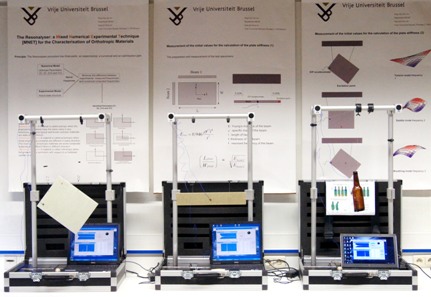The details and level of the courses depend on the background knowledge of the students.
Theoretical background (6 lectures of 2 hours)
- Finite element theory: thin plate elements with high polynomial shape functions
- Eigenvalue problem: Sturm sequences, bisection and power iteration
- Impulse excitation of constructions
- Numerical and experimental Modal analysis
- Measurement sensors (accelerometer, microphone, laser velocity meter)
- Data acquisition: theorem of Shannon, precision
- Fourier transformation
- Visual studio programming for design of user interfaces
- Elastic Material properties (isotropic, orthotropic, anisotropic)
- Inverse methods principles
- Sensitivity theory
- Working principles of the Resonalyser Method
Labo exercises (4 hours)
- Identification of isotropic plates
- Identification of orthotropic plates
- Resonalyser labo at VUB
- Engineering master students at work with Resonalyser -1
- demonstration details
- Engineering master students at work with Resonalyser-2
The resonalyser instrument is very robust and affordable and allows laboratory experiments for students to increase their skills and understanding of Dynamics, Modal Analysis, Data Acquisition, Finite Elements, Inverse Methods, … among others.
Results on Engineering Constants can be used for mechanical simulation exercises and can be compared with similar results of other available experimental measurement techniques.




